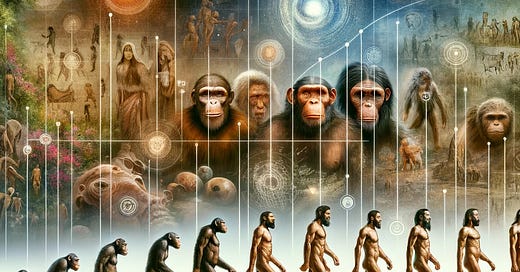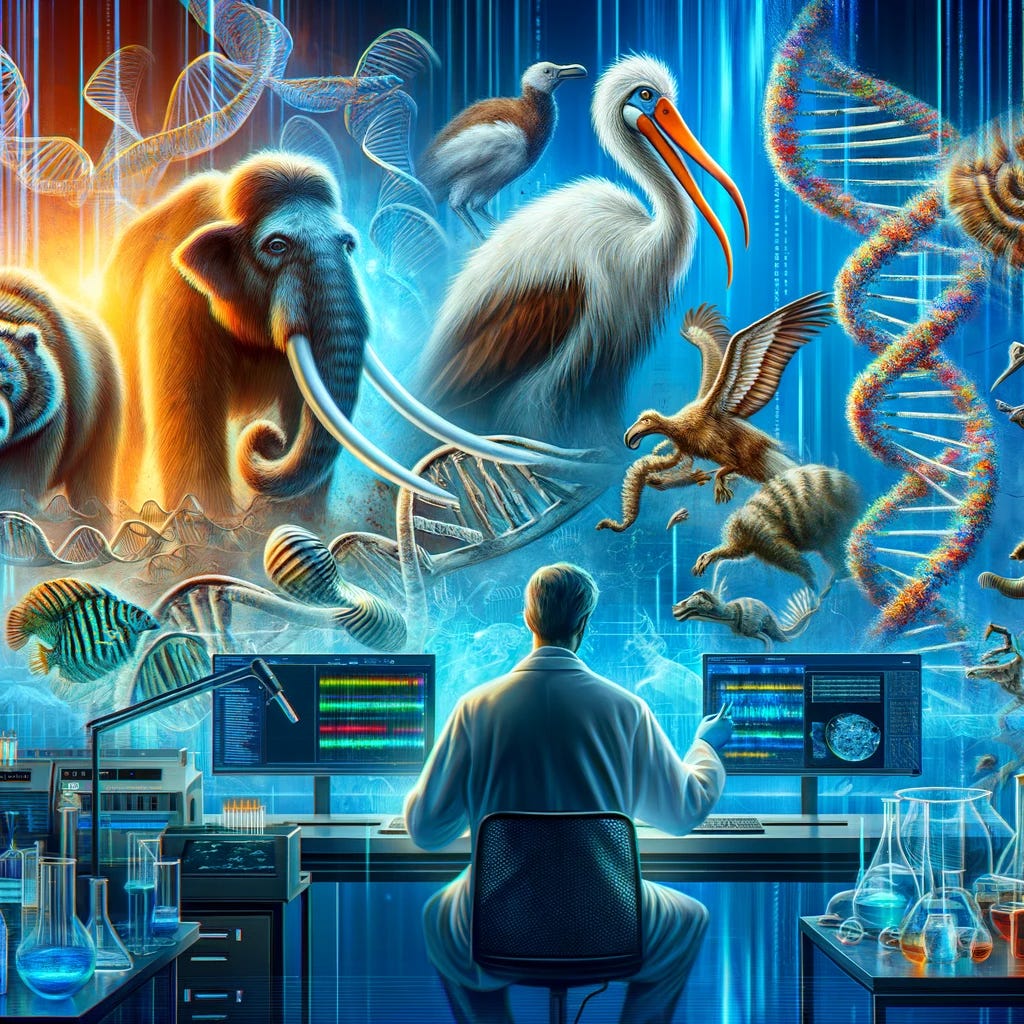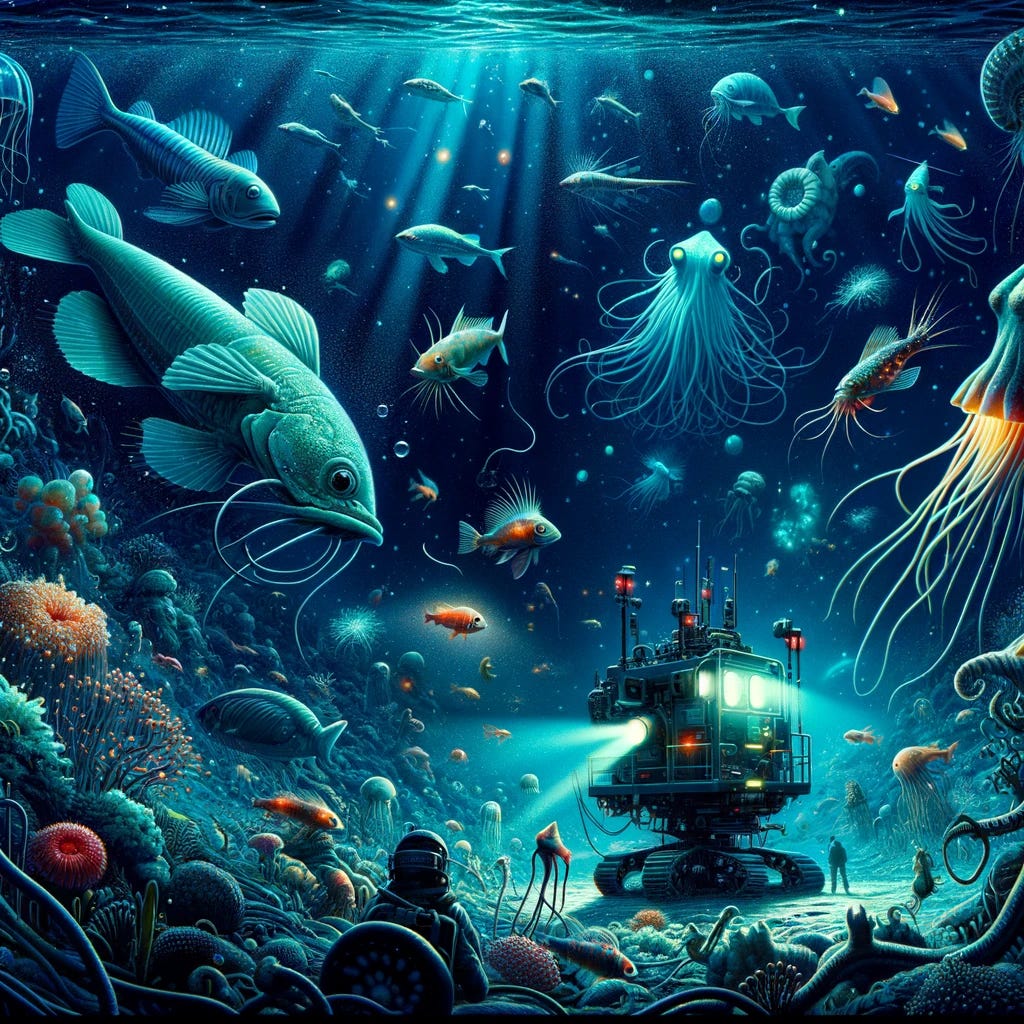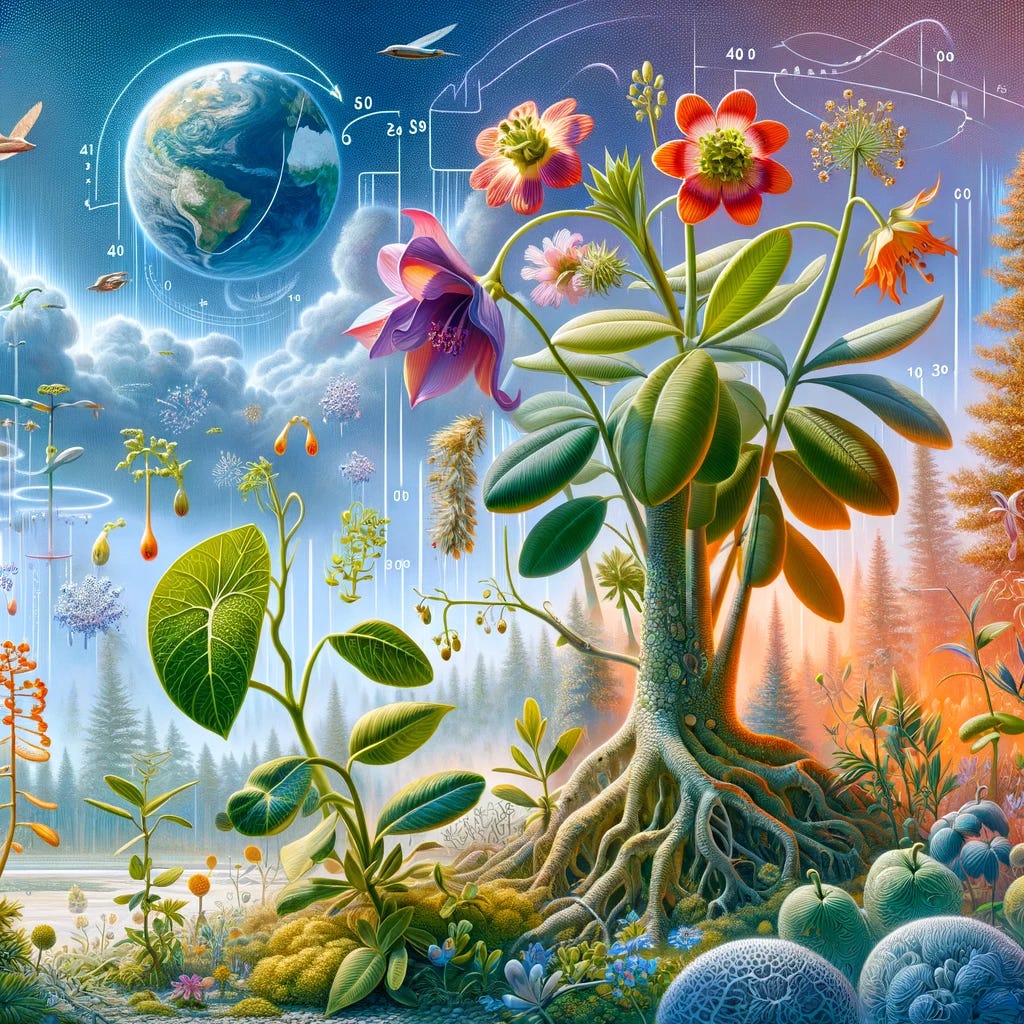Predictions for 2024 in Evolutionary Biology: Unveiling the Past, Predicting the Future
Unlocking Tomorrow: Five Predictions for Evolutionary Biology in 2024
Interested in more evolutionary biology insights? Subscribe to Genomely for the latest discoveries and in-depth analyses in your inbox.
Thank you to our subscribers for your continued support and passion for science!
Evolutionary biology — a dynamic and ever-evolving field — stands at the forefront of understanding how life on Earth has changed and continues to adapt over time. It's a scientific journey that unravels the mysteries of life, from the simplest organisms to the complexity of the human species. In recent years, with advancements in technology and genetics, the pace of discovery has accelerated, leading to groundbreaking insights and raising expectations for future discoveries. Here, we explore the potential, the hope, and the promise that 2024 may hold. We'll delve into five predicted discoveries in evolutionary biology that could redefine our understanding of life and its continuous evolution. From new insights into human evolution to the unearthing of extinct species' traits, each prediction opens a window to an exciting and transformative future in studying life's history.
Discovery 1. New Insights into Human Evolution: Unraveling Our Ancient Roots
The Prediction:
Scientists are on the cusp of uncovering finer details about our ancestry. With the integration of advanced genetic analysis and fossil studies, we are likely to witness a more nuanced understanding of our evolutionary history.
In-Depth Exploration:
The history of human evolution is a story written in bones and genes. It's a narrative that has been partially told, with many chapters yet to be unveiled. Currently, our understanding of human evolution is based on fossil records and genetic studies that have revealed a complex web of ancestral species, including Homo erectus, Neanderthals, and Denisovans. However, many gaps remain in our knowledge, particularly regarding how these species interacted and contributed to modern human genetics. I anticipate we will refine our understanding of how introgression events, or admixture between the modern human lineage and more ancestral lineages, like Neanderthals and Denisovans, culminated in the mosaic genomes we encode today.
I anticipate advances in understanding how the pangenome — genetic loci found in only some, not all, human lineages — is impacted by introgression events.
Other advances may be in understanding epigenetics in our ancient ancestors or closely related human lineages. Of course, confidently determining epigenetic modifications in ancient human genomes is a challenge, however, it is one that may possibly be overcome using machine learning and artificial intelligence. Moreover, I anticipate that our understanding of human evolution will be placed in the context of historical climates to potentially predict how we may adapt in a changing, warming world.
Broader Significance:
Such discoveries promise to provide a clearer picture of our evolutionary timeline and the factors that have shaped human biology. This knowledge not only helps us understand our past but also sheds light on current aspects of human health and disease, potentially guiding future medical advancements.
Discovery 2. Uncovering Extinct Species' Traits: Revealing the Secrets of Long-Lost Species
The Prediction:
Advances in paleogenomics — the study of ancient DNA from ancient remains — are expected to offer unprecedented insights into the physical traits of extinct species. This exploration is not just limited to prehistoric animals but also includes ancient plants and, possibly even, microorganisms.
In-Depth Exploration:
For decades, our understanding of extinct species has been primarily shaped by fossilized bones and preserved remains. However, the ability to extract and analyze DNA from bones is a game-changer.
I predict we will be able to reconstruct complete genomes from extinct species, using a combination of ancient DNA sequencing and ancestral genome reconstruction from telomere-to-telomere genomes of extant species.
Moreover, I anticipate there will be stronger collaborative efforts between paleogenomicists and ancient ecologists that use fossils to infer ecology and behavior. Such collaborations will prove to be fruitful and possibly help provide greater confidence of ancient ecological events and interactions. I also anticipate that paleogenomics among plants and microbes will further develop and mature.
Broader Significance:
The implications of these discoveries are vast. For conservation biology, it offers a window into the past biodiversity and ecosystems, aiding in current conservation efforts. In education and science communication, it provides tangible and engaging insights into the life that once inhabited Earth, sparking curiosity and interest in natural history. Finally, for evolutionary biology, it deepens our understanding of the evolutionary processes, helping to explain how certain traits evolved and why some species survived while others did not.
Discovery 3. Evolution of Drug Resistance: The Evolutionary Arms Race
The Prediction:
A critical area of predicted discovery in evolutionary biology is the understanding of how species, especially microbial pathogens, evolve resistance to diseases. This research is not only academically fascinating but also has significant implications for public health and the treatment of diseases.
In-Depth Discussion:
The concept of an evolutionary arms race between pathogens and their hosts is central to this area of study. Pathogens such as viruses and bacteria are constantly evolving to bypass the immune defenses of their hosts. In response, host species evolve new defense mechanisms. This dynamic interplay is a powerful force in evolution.
Recent advancements in genomic technologies and bioinformatics have allowed scientists to track these changes in real-time. In the near future, it is predicted that we will gain a much deeper understanding of how genetic variations in populations contribute to disease resistance. This includes not only resistance to infectious diseases but also to non-communicable diseases like cancer.
A key area of focus is leveraging machine learning and artificial intelligence for helping develop drugs to combat disease. This will include developing novel types of drugs to combat microbial infections and holds promise to tackle microbes that are currently thought of as “drug resistance.”
I predict that deep learning will help develop novel drugs to combat diseases ranging from infectious to non-communicable diseases.
Broader Significance:
The implications of understanding disease resistance evolution are vast. It can lead to more effective treatments and preventive strategies. Ultimately, artificial intelligence will ensure in a new era of drug development and 2024 will be the year deep learning and drug development reach a milestone of potential.
Discovery 4. Deep Ocean Biodiversity and Evolutionary Patterns: Exploring the Uncharted Depths of Evolution
The Prediction:
The fourth anticipated discovery in evolutionary biology ventures into the mysterious realms of the deep ocean. Significant breakthroughs are poised to be made in our understanding of the biodiversity and evolutionary history of deep-sea life, a largely unexplored and enigmatic part of our planet.
In-Depth Discussion:
The deep ocean, with its extreme conditions and unique ecosystems, is home to some of the most bizarre and poorly understood species on Earth. Despite covering the majority of the planet's surface, it remains less explored than outer space. However, with advances in deep-sea exploration technology, such as remotely operated vehicle and sophisticated sampling methods, scientists are bringing light to the secrets of these dark depths.
I predict that the unique biology of deep-sea organisms — including unique biochemical pathways and tolerance to extreme pressure and temperature — will be elucidated with genome sequencing.
This predicted discovery will likely focus on unraveling the genetic and evolutionary adaptations that enable deep-sea creatures to survive in such harsh environments. These adaptations may include unique biochemical pathways, extreme pressure and temperature tolerance, and reproductive strategies. Studying these organisms will provide insights into the limits of life on Earth, even setting the stage for our understanding of how life could look on other planets.
Moreover, the deep ocean is a treasure trove of undiscovered species. Each new expedition brings the potential of finding not just new species but entirely new ecosystems. These discoveries contribute significantly to our understanding of biodiversity and the complex web of life in our planet.
Broader Significance:
The study of deep-sea biodiversity and evolution will enhance our understanding of marine biology, ecosystem dynamics, and the evolutionary history of life on Earth. Furthermore, as we face the challenges of climate change, understanding these deep-sea ecosystems becomes increasingly important. The deep ocean plays a crucial role in carbon cycling and global climate regulation. Therefore, insights into these ecosystems can inform climate change models and conservation strategies.
Discovery 5. Adapting Green: Plant Evolution Under Climate Change
The Prediction:
The fifth and final anticipated discovery in evolutionary biology is centered on plant evolution in response to climate change. This area of study is crucial for understanding how flora around the globe will adapt to the rapidly changing environmental conditions.
In-Depth Discussion:
Plants are foundational to Earth's ecosystems, playing critical roles in climate regulation, oxygen production, and as the base of food webs. As the climate changes, plants face new challenges, including altered temperature regimes, precipitation patterns, and increased levels of atmospheric CO2. The prediction is that significant advancements will be made in understanding how these changes are driving the evolution of plants.
One key area of focus is the study of phenotypic plasticity – the ability of a plant to change its physiology or morphology in response to environmental changes. This adaptability is crucial for survival under varying conditions. (Epi)Genomic tools to unravel the genetic basis of this plasticity will facilitate these discoveries.
Another aspect is the investigation of evolutionary changes in plant populations. This includes studying shifts in traits such as flowering time, drought tolerance, and pest resistance. These studies will be crucial for agriculture, as crops must also adapt to the changing climate to ensure food security.
I predict we will deepen and prioritize expanding our knowledge of how plants adapt to climate change.
Broader Significance:
Insights gained from this research can inform conservation strategies for preserving biodiversity and ecosystem resilience. In agriculture, it can lead to the development of crop varieties better suited to future climatic conditions, aiding in the fight against global food insecurity.
Moreover, these studies contribute to our broader understanding of evolutionary biology by showcasing real-time adaptation and speciation events driven by human-induced environmental changes. They serve as a reminder of the interconnectedness of life and the impact of human activities on the natural world.
2024 will be a great year.
It's important to recognize that these represent just a glimpse into the potential advancements that 2024 holds. Evolutionary biology, with its myriad sub-disciplines, is a field ripe with possibilities and the potential to address previously unanswered questions. The predictions we've discussed — from the depths of human ancestry to the mysteries of the deep ocean, and the adaptive strategies of plants under climate change — are but a few threads in the rich tapestry of life's evolutionary story.
The year 2024 stands as a beacon for what could be an incredibly exciting time in the world of evolutionary biology. Scientists and researchers across the globe are continuously pushing the boundaries of what we know, leveraging cutting-edge technologies and innovative methodologies. This relentless pursuit of knowledge is not only about understanding the past but also about shaping our future, including informing strategies to tackle global challenges like climate change, biodiversity loss, and emerging health threats.
Moreover, these discoveries have the power to inspire. They encourage us to look at the world with curiosity and wonder, driving us to explore, discover, and protect the natural world.
While we've highlighted five exciting predictions, they represent only a fraction of what the future holds. 2024 has potential to be a landmark year, filled with discoveries that will undoubtedly deepen our understanding of life's history, how the present came to be, and what the future may hold. Let us embrace the spirit of discovery and remain open to the endless possibilities that evolutionary biology presents.









